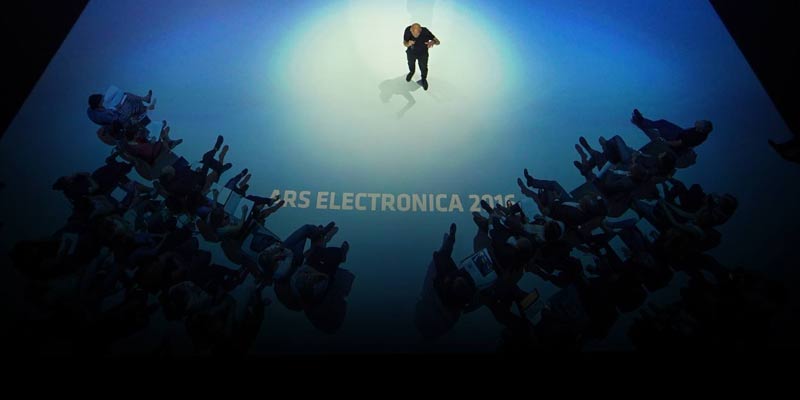Team EcoSat from Ybbs Wins the 1st Austrian CanSat Competition
Next Level Pits Them against Europe’s Best Satellite Constructors
Press release as PDF
Review of the 2018 CanSat-competition / Ars Electronica Blog
About the CanSat-competition / Ars Electronica Blog
CanSat-competition: the Rockets / Ars Electronica Blog
(Linz/Schärding, April 12, 2018) Team EcoSat representing Ybbs Technical School has been crowned 2018 Austrian CanSat Champion. The DIY satellite constructed by Klemens Fischl, Alexander Frais, Maximilian Hierner, Florian Leonhardsberger and Tobias Strondl successfully completed all missions assigned in the competition. Their next destination is the Azore,s where they’ll face the other national winners in the CanSat European Championship staged by the European Space Agency June 28-July 1. Die Edeltechniker representing the Mössingerstraße Technical School in Klagenfurt—Patrick Krumpl, Nico Trinker, Stefan Zissernig, David Petritsch and Mathias Schober—took second place, for which they received an invitation to tour the Vienna plant of RUAG Space GmbH, Austria’s largest space flight supplier. The 1st Austrian CanSat competition was staged by Linz-based Ars Electronica Center, the official European Space Education Resource Office Austria (ESERO Austria). The competition was supported by the Federal Ministry for Transport, Innovation and Technology, RUAG Space GmbH and Vienna University of Technology’s Space Team.
The CanSat Competition
CanSats are satellites the size of a cola can. They can be equipped with various sensors, depending on the requirements of their mission. A booster rocket spectacularly launches the mini-satellite to an altitude of up to 450 meters and releases it. During the CanSat’s descent, its sensors measure temperature and air pressure, and transmit these values to the ground station. Altitude and speed of descent are computed from the air pressure measurements; the temperature data are used to create a temperature profile. The CanSats are constructed by secondary school students working in teams of up to five individuals.
Simulation of a Real Space Mission
To successfully carry out a CanSat mission, the teams have to go through all phases of an actual space mission: planning, constructing the satellite, testing the individual components and the entire system, and, then, executing the mission under real-world conditions. The final stage entails preparation and evaluation of the data and presentation of the results. Throughout the mission, each individual team members is called upon to contribute technical capabilities; moreover, this process trains soft skills like teamwork and interdisciplinary thinking.
Ars Electronica Center Linz is ESERO Austria
The Ars Electronica Center has served as Austria’s European Space Education Resource Office since June 2016. Several institutions applied to host ESERO. The nod finally went to Linz’s Ars Electronica Center on the basis of the extensive educational offerings for students of all grades developed here over the years and the facility’s good working relationships with officials and organizations throughout the Austrian educational system. “ESERO fits perfectly into these structures,” the ESA noted in its announcement. ESERO’s efforts chiefly target primary and secondary school teachers, who are provided with a wide array of instructional material and a continuing professional education program. Its primary mission is to get young people interested in outer space as well as the scientific and technological fields associated with the cosmos. The CanSat competition, which will henceforth be held annually, makes a substantial contribution to achieving this aim. ESERO-Austria is financed by the European Space Agency, Austria’s Federal Ministry for Transport, Innovation and Technology, and the FFG–Austrian Research Promotion Agency.
http://www.flickr.com/photos/arselectronica/27513292808/
Winning Team: EcoSat / Fotocredit: Ars Electronica – Vanessa Graf / Printversion / Album
http://www.flickr.com/photos/arselectronica/39575689230/
Preparation work / Fotocredit: Ars Electronica – Vanessa Graf / Printversion / Album
http://www.flickr.com/photos/arselectronica/39575674360/
Waiting for the take off / Fotocredit: Ars Electronica – Vanessa Graf / Printversion / Album
http://www.flickr.com/photos/arselectronica/26514611007/
Ground-control / Fotocredit: Ars Electronica – Vanessa Graf / Printversion / Album
http://www.flickr.com/photos/arselectronica/39576205840/
Preisverleihung / Fotocredit: Ars Electronica – Vanessa Graf / Printversion / Album

